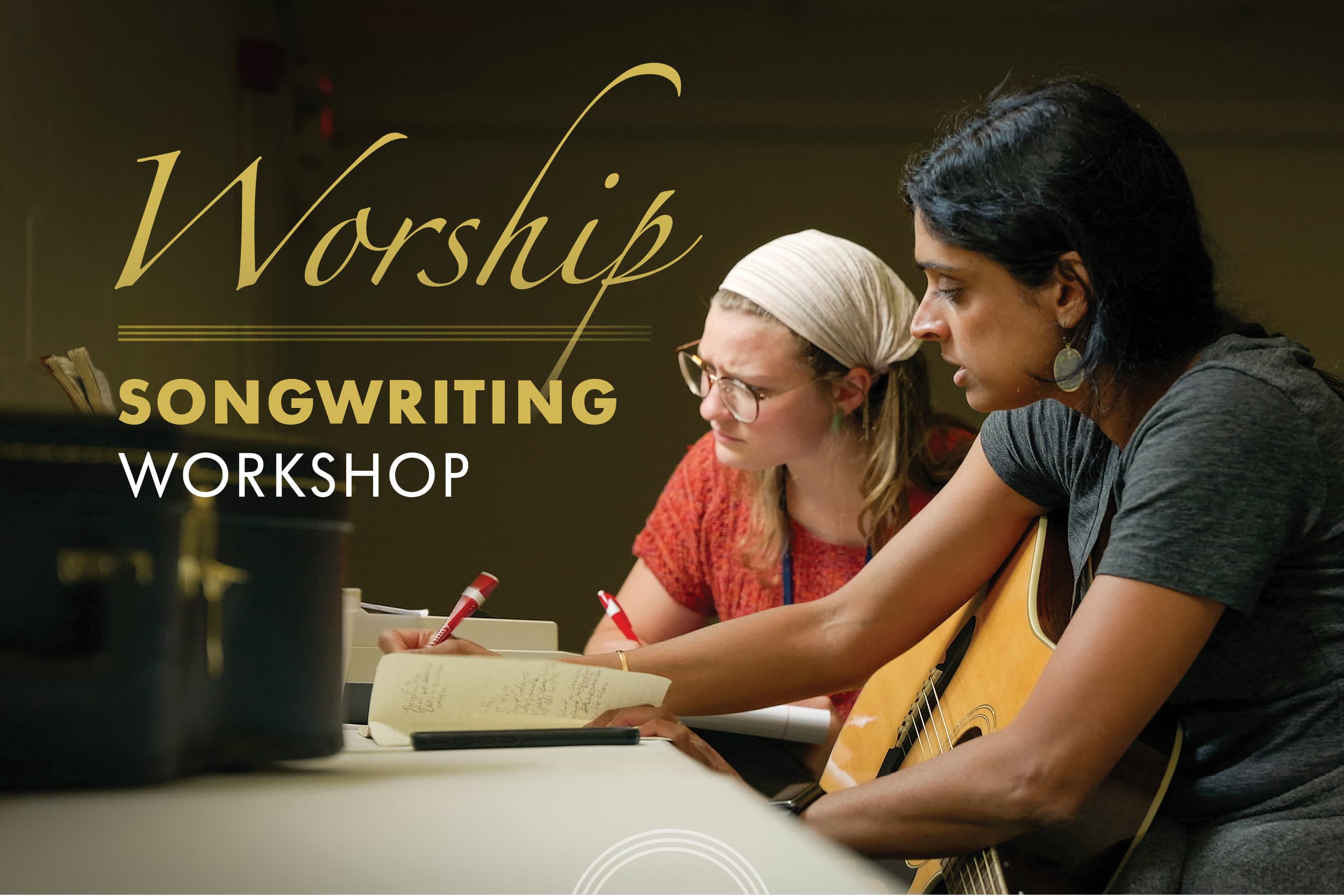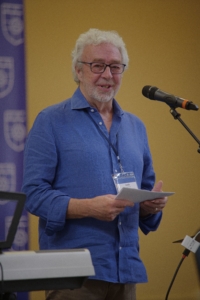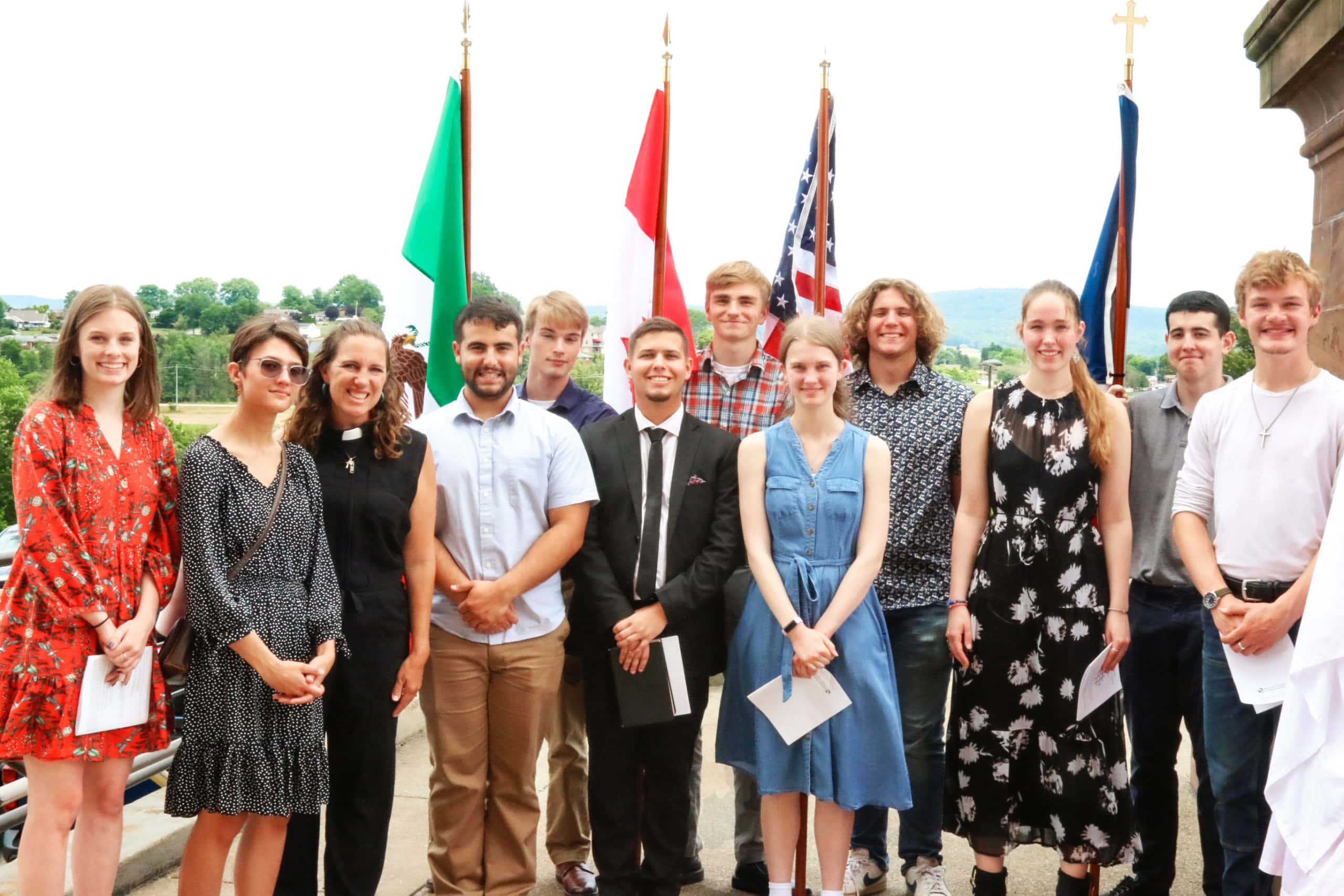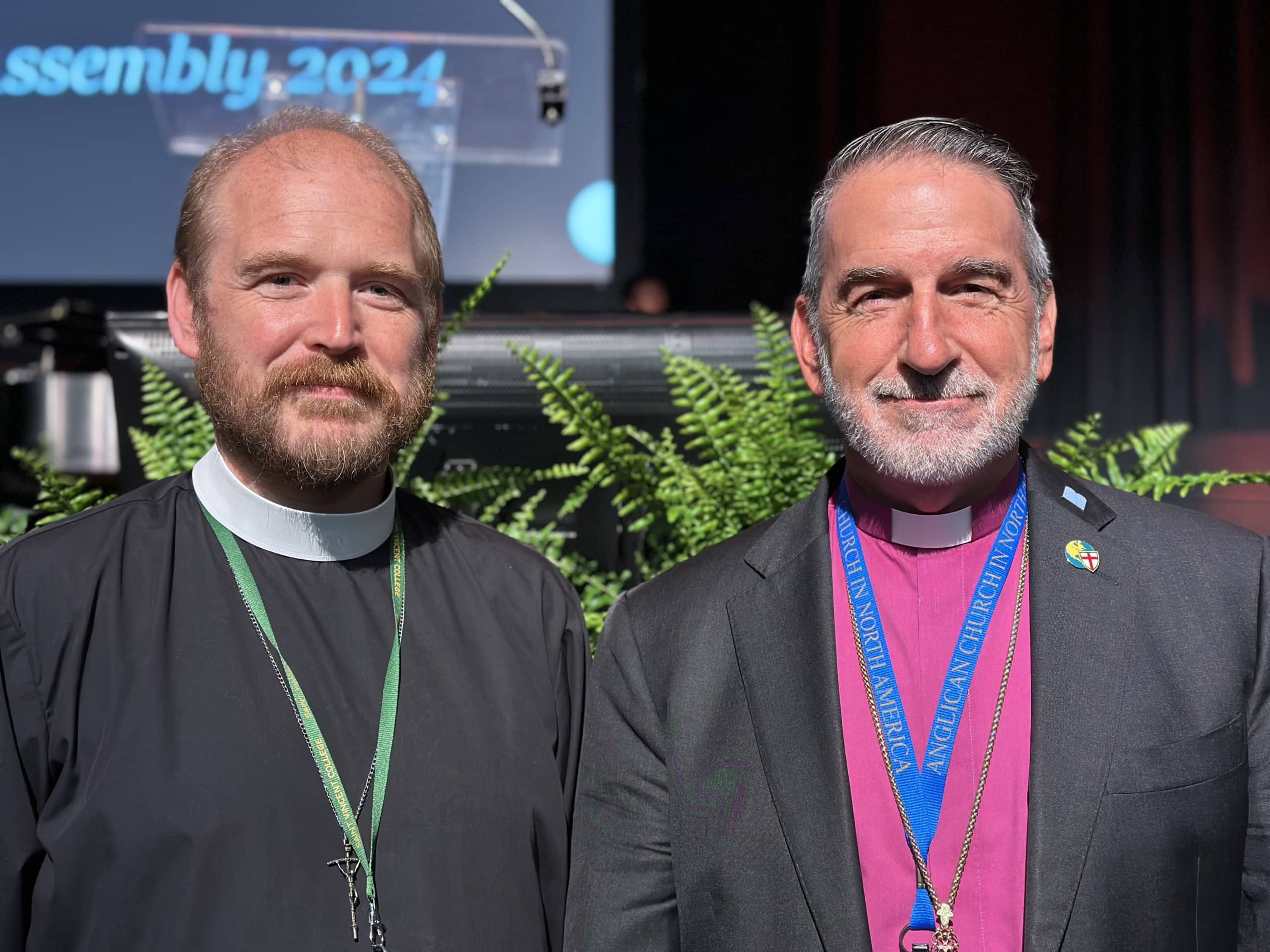“CREATIVITY IS ALWAYS A LEAP OF FAITH. YOU’RE FACED WITH A BLANK PAGE,
BLANK EASEL, OR AN EMPTY STAGE.” – Julia Cameron
A common challenge recounted by people who write, compose, or create visual art, is the terror of the blank page, blank score sheet, or blank easel. Where do you begin? What direction do you hope to take the creative endeavor? No matter how successful the last piece of creative work may have been, to begin a new creative work is to start from scratch. The purpose of the June 2023 Worship Songwriting Workshop held at Trinity School for Ministry in Ambridge, Pennsylvania, was to revitalize creativity and equip songwriters and wordsmiths in the creative process for worship in music.
Songwriter, performer, and music producer Andy Piercy formed the workshop, entitling it, “Expanding Your Creative Thinking” because his hope was to “open windows.” In his British accent, he explains, “I try and hold them up and say, ‘Have you seen out of this window? See?’ And I want people to say, ‘Oh, oh, look out there, let me include that in my perspective.’”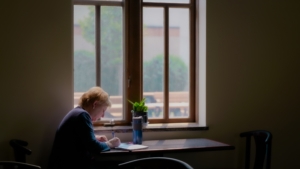
The workshop description states, “All of us occasionally hit limitations and roadblocks in our songwriting, which can result in predictability and discouragement.” But as Andy expounds, the purpose is beyond encouraging creativity,
They will rebuild the ancient ruins,
and restore the places long devastated
they will renew the ruined cities
that have been devastated for generations.
-Isaiah 61:4
Singer/songwriter and self-described storyteller Caroline Cobb made the trip from Texas to encourage songwriters – to help open windows–and perform in a special evening concert. “I think that one of my favorite things to do is to tell other songwriters that what they’re doing does matter, even though it may not be your typical ministry role or you might not be able to see all the ways that God is bearing fruit through your work.” Caroline describes her lifework as telling the story of scripture through music:
“Like any good story, the Bible demands to be read and retold again and again. It’s a deep well, beckoning us to come further up and further in. So, I keep writing from Scripture, looking at this same story from new angles, just as you’d turn a diamond to let each slant and gradient shine some new light.”
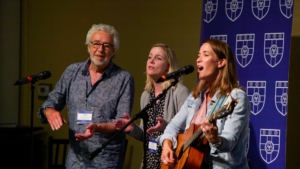
Through the liturgy of the Daily Office she has been trusting God to shape her through the Word in devotions and, as a consequence, influencing the songs she ends up writing. Her latest album, Psalms: The Poetry of Prayer, is the fifth in an anthology of five “story-telling” projects. Many of the songs began to be composed during her devotional times as she prayed the Psalms back to God.
Psalms took a prominent place throughout the workshop as evidenced by the songwriting prompt led by singer/songwriter Rachel Wilhelm. Rachel began her section of the workshop by singing Psalm 37:4, “Delight yourself in the Lord and he will give the desires of your heart.” The tune is catchy enough that the 20 or so participants quickly accompanied her, singing the tune back to her. Then Rachel continued to lightly play the chords to the song on her guitar as one of the participants read Psalm 37:1-6 out loud:
Fret not yourself because of evildoers;
be not envious of wrongdoers!
For they will soon fade like the grass
and wither like the green herb.
Trust in the LORD, and do good;
dwell in the land and befriend faithfulness.
Delight yourself in the LORD,
and he will give you the desires of your heart.
Commit your way to the LORD;
trust in him, and he will act.
He will bring forth your righteousness as the light,
and your justice as the noonday.
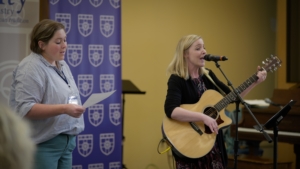 Rachel’s guitar swelled in crescendo and everyone joined in song again with the Psalm 37:4 refrain. This dance between song and recitation goes back and forth between the reader and the group so that by the end, the verse and song has become the most pleasant of earworms in everyone’s mind – and heart. (An “earworm” is a tune that becomes sticky or memorable, such that it continues to occupy a person’s mind even after it is played.)
Rachel’s guitar swelled in crescendo and everyone joined in song again with the Psalm 37:4 refrain. This dance between song and recitation goes back and forth between the reader and the group so that by the end, the verse and song has become the most pleasant of earworms in everyone’s mind – and heart. (An “earworm” is a tune that becomes sticky or memorable, such that it continues to occupy a person’s mind even after it is played.)
Often, in Anglican churches, Psalms are read responsively or in unison. Rachel shared, “I thought, well, gosh, Psalms are meant to be sung so why don’t we use all we have rather than, you know, not use it? So, I love to connect the heart with the reading and music is a really powerful way that the Lord has provided for us. So why not add beauty? But I think it takes an imagination to find creative ways to bring beauty to and illuminate scripture.”
Rachel introduces the song element to the Psalms in a lighthearted manner by suggesting that the process would be like a game: she would sing to them first and then they were going to sing the same refrain back. She finds that congregations are receptive and quickly learn to sing the refrain from the Psalm.
“It’s really formative for me, spiritually to work on these…I’m looking through that Psalm of the day and I’m looking for that nugget idea – the nugget idea that I want the congregation to sing back. I want that to stick in their brain throughout the week and minister to them and form them spiritually. It’s a lovely thing because the truth of scripture can burrow deep into the congregant’s heart, plant, take root, and grow.”
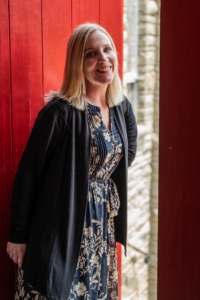 Rachel is also the Vice-President of United Adoration, a ministry within the Anglican Church in North America, and “on a mission to revitalize the creativity of the local church by empowering artists to create in their own language, culture, and context.” As song worship has become more commercialized, some churches are recognizing their artists and musicians within the local church can be tapped to create sacred space.
Rachel is also the Vice-President of United Adoration, a ministry within the Anglican Church in North America, and “on a mission to revitalize the creativity of the local church by empowering artists to create in their own language, culture, and context.” As song worship has become more commercialized, some churches are recognizing their artists and musicians within the local church can be tapped to create sacred space.
She finds that this mission resonates well within the Anglican church because of the focus on beauty, particularly in the liturgy. “You’ve already got the structure, you’ve got beautiful language, and a well-rounded service from start to finish with scripture and communion…
“…the Anglican tradition encourages the intake of all facets of the senses so it is natural that the arts are a part of that.”
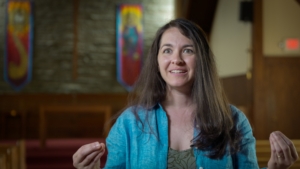 One of the participants in the workshop and a United Kingdom Team Leader for United Adoration, Elise Massa, says that the goal of these types of songwriting workshops is to “help artists step out of the isolative nature of their craft and into community…because artists within community flourish. United Adoration really does seek to help cultivate the heart of the artist connecting fi rst and foremost with the Lord, and then, as God does work in us, most creatives can’t help but testify to that work through their art.”
One of the participants in the workshop and a United Kingdom Team Leader for United Adoration, Elise Massa, says that the goal of these types of songwriting workshops is to “help artists step out of the isolative nature of their craft and into community…because artists within community flourish. United Adoration really does seek to help cultivate the heart of the artist connecting fi rst and foremost with the Lord, and then, as God does work in us, most creatives can’t help but testify to that work through their art.”
Elise is clearly gifted musically as she adeptly throws a configuration of guitar chords and then piano melodies together in an improvisation that sounds like it has been practiced long before the workshop began. But when creative prompts, like Rachel’s challenge to compose a refrain from a Psalm, are given to Elise and a random workshop partner, there is a synergy at work that seemingly emerges from thin air in a beautiful marriage of scripture, melody, and rhythm. The refrain is easily recalled and as Rachel explains, “…something really mystical happens because the mind and the heart are now connected.”
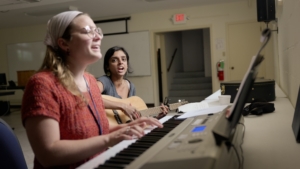 After Rachel’s prompts were given, participants spread out around the campus of Trinity. This meant that around every corner, one would stumble on an intense session of song composition: the echoes of a duet in a stairwell, strumming guitars on a picnic table in the humid summer air, or the deep, soulful wail of a cello in the carpeted chapel. In the basement of the chapel building, Sindhu Giedd, Director of Music at Holy Cross Cathedral in Loganville, Georgia, is working through a song on the guitar with another participant. They are quickly scratching down chords, dynamic markers, and lyric adjustments as they are being called back to the main hall to share their song. Before they play the song to the group, there is not a lot of explanation and preamble; they try and let the music speak for itself. The song soars. Both sound like they have recorded an album or two together before, but they have only had thirty minutes of time to create and practice. After they play, the group responds to this and each performance with hearty encouragement and authentic commentary. There is a concerted effort to avoid a sense of competition, but rather, foster an invitational, creative flow.
After Rachel’s prompts were given, participants spread out around the campus of Trinity. This meant that around every corner, one would stumble on an intense session of song composition: the echoes of a duet in a stairwell, strumming guitars on a picnic table in the humid summer air, or the deep, soulful wail of a cello in the carpeted chapel. In the basement of the chapel building, Sindhu Giedd, Director of Music at Holy Cross Cathedral in Loganville, Georgia, is working through a song on the guitar with another participant. They are quickly scratching down chords, dynamic markers, and lyric adjustments as they are being called back to the main hall to share their song. Before they play the song to the group, there is not a lot of explanation and preamble; they try and let the music speak for itself. The song soars. Both sound like they have recorded an album or two together before, but they have only had thirty minutes of time to create and practice. After they play, the group responds to this and each performance with hearty encouragement and authentic commentary. There is a concerted effort to avoid a sense of competition, but rather, foster an invitational, creative flow.
Sindhu strongly affirmed Caroline and Rachel’s advocacy for worship leaders to write more songs specifically for their people: “I often have a sense of maybe something God might be doing in our congregation or specifically in the lectionary that I know my pastor is going to be trying to hone in on. But I might not be able to actually find a good song because there aren’t any.
“…Yes, there are a lot of great songs, but there are certain passages, for instance, John 11, I could not find a song for it. So, I thought, ok, well, I guess I’m writing a song on John 11 for our people to sing because it is such a meaningful passage.”
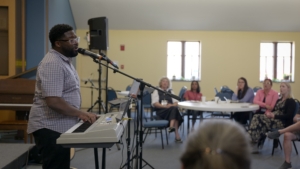 The workshop took a refreshing turn when Nate Glasper, Jr., a resource development specialist and choir director from the Calvin Institute of Christian Worship, talked about how to make songs that choirs can easily grab and sing. Choir music is generally not as wordy, making it easier to remember. Much of what is currently being written is oriented to worship teams, but a choir can be more multi-generational and a multi-ethnic expression of the congregation. Nate grew up in a black church, Pentecostal environment singing gospel music with a lot of call and response structure. However, he teaches in a cultural environment that likes to sing hymns or songs with dense lyrics. “I’ve been trying to utilize those songs but also bridge a simple refrain or melody that even the younger group can adapt to as well. Like Great Is Thy Faithfulness and then adding a refrain and call and response at the end that we can all engage in, but reflecting on what we just sang.” He sees his job as a bridge; songwriting that remains true to the Word but can be adapted and particular in style to the community.
The workshop took a refreshing turn when Nate Glasper, Jr., a resource development specialist and choir director from the Calvin Institute of Christian Worship, talked about how to make songs that choirs can easily grab and sing. Choir music is generally not as wordy, making it easier to remember. Much of what is currently being written is oriented to worship teams, but a choir can be more multi-generational and a multi-ethnic expression of the congregation. Nate grew up in a black church, Pentecostal environment singing gospel music with a lot of call and response structure. However, he teaches in a cultural environment that likes to sing hymns or songs with dense lyrics. “I’ve been trying to utilize those songs but also bridge a simple refrain or melody that even the younger group can adapt to as well. Like Great Is Thy Faithfulness and then adding a refrain and call and response at the end that we can all engage in, but reflecting on what we just sang.” He sees his job as a bridge; songwriting that remains true to the Word but can be adapted and particular in style to the community.
“The ideal is when the congregation feels they’re owning the worship – they’re not an audience but they’re owning the worship. That’s quite important,” says Andy.
At the time of the workshop, Rachel was finishing an album based on the book of Jeremiah, the lamenting prophet (the album has since been released and can be found here). “I really love lament because lament brings you close to the Lord and lament already has a hope built in,” she says. Rachel strongly identifies with Jeremiah as he is asking the Lord to meet him through pain, sorrow, and grief, trusting already that he’s going to do something.
Creating can be an act of faith. A faith that sometimes reflects the wrestling and striving with God that happens through life’s experiences. Through the exercises like Rachel’s, the challenging, iron-on-iron musical collaborations, and through Scripture shaping minds and hearts, the net result of the workshop appeared to have its intended effect in feeding the faith and creativity of the participants.
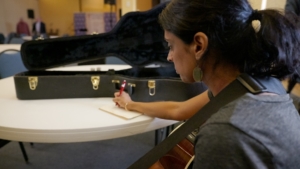 Sindhu nicely summarized the workshop when she was asked about her big takeaway saying, “God really cares about beauty and aesthetic, not in a way to manipulate people to feel something, but to create spaces where you are connecting with the Holy Spirit in a way that makes us even more human…more of what we are made to be – we’re made to feel, we’re made to connect, we’re made to think deeply. And so tools like poetry and the tools we have in music theory are actually gifts from God to be thought through well to create something beautiful – to make people feel, with the purpose of connecting with the Trinity.”
Sindhu nicely summarized the workshop when she was asked about her big takeaway saying, “God really cares about beauty and aesthetic, not in a way to manipulate people to feel something, but to create spaces where you are connecting with the Holy Spirit in a way that makes us even more human…more of what we are made to be – we’re made to feel, we’re made to connect, we’re made to think deeply. And so tools like poetry and the tools we have in music theory are actually gifts from God to be thought through well to create something beautiful – to make people feel, with the purpose of connecting with the Trinity.”

